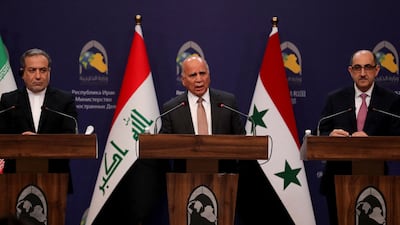Live updates: Follow the latest on the Syrian rebel advance
As Syria’s conflict further deepened on Sunday with the collapse of President Bashar Al Assad's decades-old regime, Iraq finds itself at a crossroads and under growing pressure to navigate the delicate balance between national security and regional politics.
Hayat Tahrir Al Sham, the powerful Sunni-led rebel group, and its allies have made significant gains in their nearly two-week assault, capturing Damascus and forcing Mr Al Assad to flee for unknown destination. The rebels' assault, which began on November 27, has raised fears in Baghdad of instability across Iraq's western border and a possible spillover of sectarian violence.
Abu Mohammad Al Jolani, the leader of HTS, which is designated as a terrorist group by the US, Britain, EU, Canada and some other countries, has declared that HTS has no ambitions in Iraq and that he wants to have strategic and economic ties with Baghdad once the group has toppled the Assad regime. But his words carry little weight in Iraq.
Since the HTS assault, Iraq has ramped up security along with its 600-kilometre border with Syria, deploying thousands of troops and members of the Popular Mobilisation Forces (PMF), an umbrella group of state-sanctioned militias which includes factions with deep ties to Iran and experience fighting in Syria.
“The Iraqi government is closely monitoring the situation in Syria and actively coordinating with regional and international partners to prevent Syria from descending into chaos or falling into the hands of terrorist groups,” a senior adviser to Iraqi Prime Minister Mohammed Shia Al Sudani told The National on Thursday.
Iraq’s primary concerns include the potential escalation of threats near its borders, the protection of holy Shiite sites such as the Sayyidah Zainab shrine in Damascus, the prevention of ethnic cleansing against minorities, and the avoidance of an Islamic State-like entity that could become a hub for terrorist activities, he added.
However, any action taken by Baghdad will not be unilateral as Iraq “is committed to close co-operation” with the US-led anti-ISIS international coalition to “ensure that threats are effectively addressed”.
Iraqi Foreign Minister Fuad Hussein hinted at a similar line on Friday in a press conference after a trilateral meeting in Baghdad with his Syrian and Iranian counterparts.
“The international coalition was established to fight terrorism first in Iraq, and Iraq is a founding member of it,” Mr Hussein said. “The international coalition continues fighting terrorism in many countries.”

Legitimate fears?
History and geopolitics paint a more complicated picture. Memories among Iraqis are still vivid of when thousands of extremists crossed into Iraq from Syria after the 2003 US-led invasion, which was followed by years of sectarian killings. The biggest onslaught came in mid-2014 and ended with ISIS controlling swathes of northern and western Iraq, unleashing a devastating war for nearly four years.
Mr Al Jolani himself began his fighting career with Al Qaeda in Iraq, where he was imprisoned by the US, before moving to Syria to set up the extremist group's franchise there. He later split from Al Qaeda in 2016 to form HTS.
While the PMF has so far adhered to a defensive strategy, some of its factions, particularly those aligned with Iran, expressed readiness to act beyond Iraq’s borders if necessary as the rebels started to capture provinces one after one and headed to Damascus.
Kataib Hezbollah, one of the most influential groups who has been fighting in Syria since the outbreak of its civil war in 2011, kept itself away from the fight in Syria. It called on the government to send “official military troops in co-ordination with the Syrian government as these groups threaten Iraq’s national security and the region”. At least one armed faction, Abu Al Fadhil Al Abbas, has launched a recruitment drive.
Former prime minister Nouri Al Maliki, who wields considerable influence within a wide ruling coalition supporting the government, has warned that “any disruption to Syria’s stability and unity will affect the entire region. It is a dam that will break, leading to spillover and expansion”.
Echoing demands by Iran, Mr Al Maliki urged regional and Islamic countries to support Syria not only politically and economically but also “in terms of security and the military".
"That must be done to the extent that deters the advance of these terrorist groups,” he said.
Senior politician Hadi Al Amiri, who heads the Badr Brigade, a paramilitary organisation with a presence in Syria, has expressed a similar view, but powerful Iraqi cleric Moqtada Al Sadr has disagreed. In a statement, Mr Al Sadr called on the government to prevent any “interference” from its territories in the escalating Syrian conflict whether from official forces or militias, saying the Syrian people “are the only ones concerned with determining their fate”.

As Iraqi leaders debate their next steps, the question looms: Can Iraq avoid being pulled into Syria’s chaos, or is its involvement inevitable? For now, the government seems intent on a policy of cautious containment. But as the conflict unfolds, Iraq may find that staying out of Syria’s war is easier said than done.
Tehran looms large in this equation. As the linchpin in the Axis of Resistance of armed groups across the region, Iraq is under quiet but persistent pressure to contribute to Iran’s regional strategy, especially as other allies like Hamas and Hezbollah face increasing strain.
“The factions seem hesitant given the retreat of Russia’s supportive role for the Bashar Al Assad government as well as Iran’s weakness and inability to rescue him,” Ihsan Al Shammari, head of the Iraqi Political Thinking Centre in Baghdad, told The National.
“They realise that fully committing to Syria would be akin to suicide or a massacre,” he said, but added that some might move to defend Damascus until a settlement is reached.


